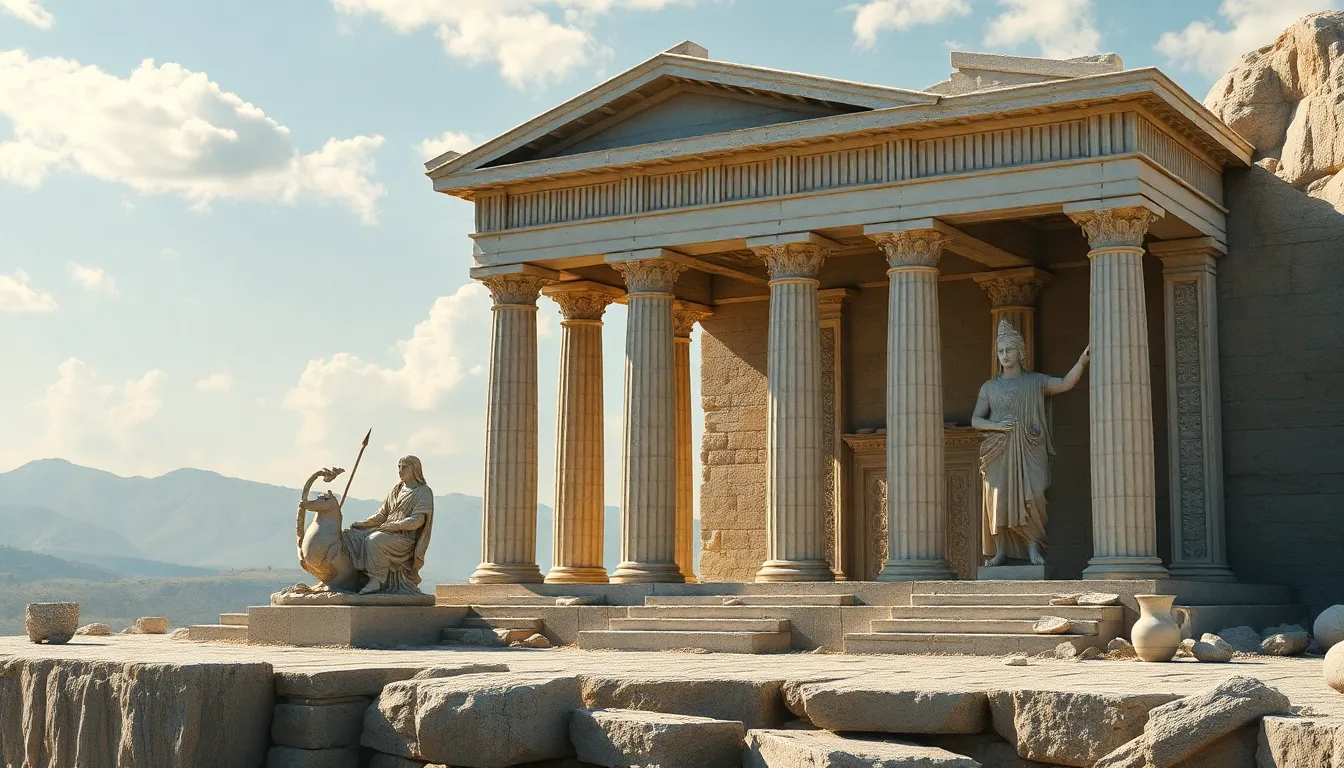The Role of Myth in Ancient Greek Society: More Than Just Stories
I. Introduction
Myth, in the context of Ancient Greece, refers to the traditional stories that were passed down through generations, often involving gods, heroes, and the explanations of natural phenomena. These narratives were more than mere tales; they were integral to the cultural and social fabric of Greek society.
The significance of myths transcends simple storytelling. They served as vehicles for conveying complex ideas about morality, existence, and the human experience. Myths were woven into the very identity of the Greek people, influencing their values, beliefs, and practices.
This article aims to explore the multifaceted role of myths in Ancient Greek society, examining their historical context, educational value, religious significance, artistic influence, reflection of societal norms, and their enduring legacy in modern interpretations.
II. Historical Context of Greek Myths
The origins of Greek mythology can be traced back to the earliest civilizations in the region, such as the Minoans and Mycenaeans. As these cultures evolved, so did their myths, which were influenced by various factors, including trade, conquest, and cultural exchange.
The cultural and social landscape of Ancient Greece was marked by city-states, each with its own unique customs and beliefs. Myths played a crucial role in unifying these communities, providing shared narratives that fostered collective identity.
Key figures and texts, such as Homer’s “Iliad” and “Odyssey,” Hesiod’s “Theogony,” and later works by playwrights like Aeschylus and Sophocles, shaped the mythology that has come down through the ages. These texts not only preserved myths but also contributed to their evolution.
III. Myths as Educational Tools
Myths served as powerful educational tools, imparting moral lessons and ethical values to the populace. They often illustrated the consequences of human actions, teaching audiences about virtues like courage, wisdom, and justice.
- Teaching Ethics and Values: Myths conveyed essential moral lessons, such as the dangers of hubris through the stories of figures like Icarus and Narcissus.
- Use in Education and Rhetoric: Educators utilized myths to teach rhetoric and philosophy, encouraging students to engage in critical thinking and debate.
- Shaping Civic Identity: Myths fostered a sense of belonging and identity among citizens, reinforcing the values of their city-states.
IV. Myths and Religion
The interconnectedness of myth and worship was a defining characteristic of Ancient Greek religion. Myths provided the narratives that underpinned religious practices and rituals.
Major deities such as Zeus, Athena, and Apollo were central figures in these myths, each associated with specific stories that explained their powers and influence over human affairs.
- Festivals: Festivals like the Olympic Games were deeply rooted in mythology, celebrating the gods and their stories.
- Rituals: Daily life included rituals that invoked the favor of the gods, often based on mythological traditions.
V. Myths and the Arts
The influence of myths on ancient literature and theater is profound. Playwrights drew inspiration from mythological themes, creating works that explored human emotions and moral dilemmas.
- Literature and Theater: The tragedies and comedies of playwrights like Euripides and Aristophanes often referenced myths to convey complex narratives.
- Sculpture and Painting: Artists depicted mythological scenes in their works, capturing the grandeur and drama of ancient tales.
- Inspiring Creativity: Myths served as a wellspring of inspiration for artists, influencing styles and movements throughout history.
VI. Myths as a Reflection of Society
Myths offer valuable insights into the social norms and gender roles of Ancient Greece. They reflect the values, beliefs, and struggles of the society that created them.
- Social Norms: Myths often reinforced societal expectations, portraying ideal behaviors for men and women.
- Political Commentary: Many myths served as allegories for political structures, critiquing power dynamics and governance.
- Adaptability: As society evolved, so too did myths, allowing them to remain relevant and reflective of changing values.
VII. Myths in Modern Interpretation
The enduring legacy of Greek myths is evident in contemporary culture. Their themes and characters continue to resonate, finding new life in literature, film, and art.
- Adaptations: Modern adaptations of Greek myths can be found in novels, movies, and television shows, often reinterpreting ancient stories for new audiences.
- Psychological Contexts: Myths have also been explored in psychological frameworks, such as Jungian archetypes, highlighting their relevance in understanding human behavior.
- Philosophical Discussions: Greek myths remain a rich source for philosophical inquiry, prompting discussions about morality, existence, and the human condition.
VIII. Conclusion
In summary, the multifaceted role of myths in Ancient Greek society cannot be overstated. They were not merely stories; they were essential components of education, religion, art, and social commentary.
The importance of preserving and understanding these narratives lies in their ability to provide insights into the human experience, reflecting both the values of the past and their relevance to contemporary society.
Ultimately, Greek mythology continues to have a lasting impact on human culture, inspiring generations and enriching our understanding of the world around us.




